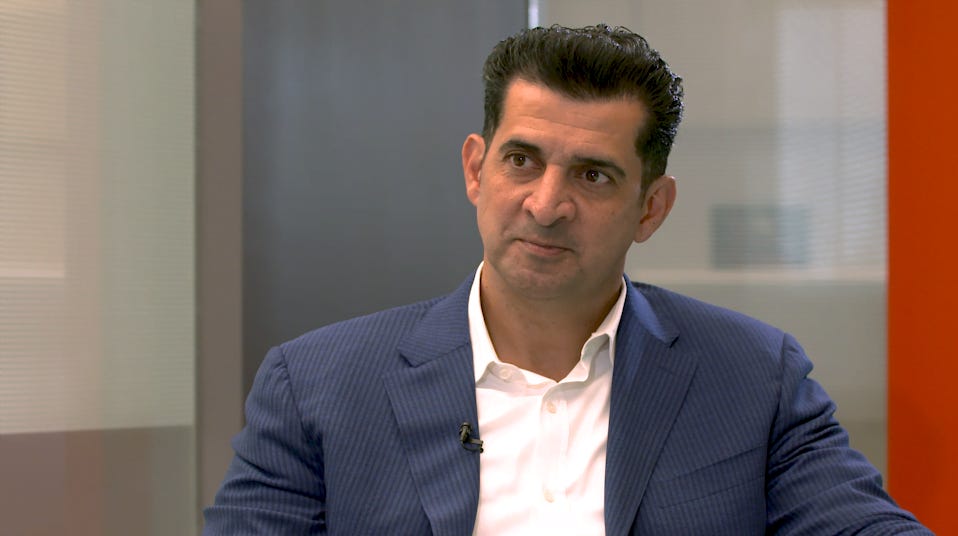If perceptions are worth anything, then Patrick Bet-David is the type of success story that promotes the American value of opportunity in the US allowing you to achieve whatever you want to be or do.
It’s a sales pitch that’s hard to argue against especially if you happen to know Bet-David. He trades proudly off his past, using opportunity created through the “American Dream.”
Born in Iran to Armenian and Assyrian parents, Bet-David’s rise to prominence is a classic immigrant success story. His family fled to the US following the Iranian Revolution, and then going on to establish a successful career in finance and media. His story — overcoming hardship, building a business empire, and creating a successful podcast — resonates with the American dream narrative, endearing him to a wide audience of which I was an admirer.
It’s difficult admiring a person who forgets their roots and stands for nothing. The PBD Podcast is a premise built on a lie.
Bet-David is known to millions as the face behind PBD Podcast - his reputation is as a successful American businessman, motivational speaker, and thought leader.
His interviews are often with political figures, entrepreneurs, and cultural commentators - positioning him as a voice of reason for millions world-wide, or that’s what he’s led his audience in to believing.
The October 7, military action by Hamas to fight back against Israel has exposed Bet-David as a sell-out to his Middle Eastern heritage - a voice of silence for Israel’s genocidal mania and a man refusing to condemn Israel treading carefully not to offend his Zionist investors.
There’s no way Bet-David can sit silent against Israel’s genocidal mania unless he’s financially compromised, and that seems to be the case.
In recent months, observers have questioned his allegiances, particularly when it comes to his stance on one of the most hotly debated topics in global politics: the slaughter of Palestinians.
Bet-David's conspicuous silence on Israel’s actions toward Palestinians — actions which many international human rights organisations have condemned as genocidal — has led millions to speculate his views may be influenced by Zionist funding or pressure.
While these allegations are unproven, the pattern of his responses, or lack of, when confronted with tough questions about Israel, has fuelled public speculation and distrust.
With success comes scrutiny, and Bet-David is no exception. His podcast is lauded for its wide-ranging topics. However, when it comes to controversial geopolitical issues — especially Israel’s ongoing treatment of Palestinians — he’s been evasive. His refusal to take a stance on Israel’s crimes, when challenged, leaves many questioning whether his opinions are compromised by outside financial or ideological interests.
One Bet-David episode of his podcast point as a flashpoint for the controversy. In this episode, during an interview with a political commentator, Bet-David was asked about his thoughts on Israel’s treatment of Palestinians, particularly considering allegations of human rights abuses.
When faced with pointed questions about Israel’s policies, including the demolition of Palestinian homes, the blockades in Gaza, and the systematic displacement of Palestinian families, his response was surprisingly subdued. Instead of engaging in the discussion, he shifted the conversation away from Israel’s actions and offered no substantive criticism of the Israeli government.
Viewers reaction was swift. Many saw his avoidance of the issue as a clear indication he was unwilling to acknowledge, let alone criticise, the increasingly widespread accusations of genocide against Palestinians.
His decision to not only sidestep the question but avoid addressing Israel's long-standing history of violations raised red flags among his audience. Why would someone who presents himself as a critical thinker and entrepreneur refuse to speak out on such a crucial issue?
For some, the answer was clear: Bet-David’s silence may be a result of financial ties to Zionist interests.
While there’s no hard evidence to confirm Bet-David is directly funded by Zionist organisations, the speculation persists due to many factors. First, Bet-David has built a large following within conservative circles in the US, a demographic that often includes strong pro-Israel sentiments. Many of the guests on his podcast share these views, and some are even outspoken advocates for Israel’s right-wing policies.
This overlap between his audience and pro-Israel circles has led some to wonder whether Bet-David’s reluctance to criticise Israel stems from a fear of alienating his base or losing financial support from pro-Zionist backers.
Bet-David’s hesitancy to address Israel’s policies fits into a larger pattern of media silence on Palestinian suffering in the US. Despite the overwhelming evidence presented by human rights organisations, and the United Nations, many American media figures and politicians avoid criticising Israel. This hesitance is often attributed to the influence of powerful pro-Israel lobbying groups like the American Israel Public Affairs Committee (AIPAC), which wield significant political and financial power in Washington.
Conversations about Israel’s treatment of Palestinians are often stifled, and those who speak out against the Israeli government’s crimes are marginalised or attacked as “anti-Semitic.” This creates a chilling effect, making it difficult for public figures to offer honest critiques of Israel without risking their careers or platforms.
For those who have followed Bet-David’s career, his apparent reluctance to address Israel’s actions represents a sharp departure from his usually bold, unapologetic style. On topics ranging from entrepreneurship to U.S. domestic politics, Bet-David is often confident and willing to take controversial stances. Yet, when it comes to Israel, he seems to buckle under pressure, avoiding direct answers or offering vague, noncommittal responses.
His inconsistency has fueled suspicions that s views on Israel are not entirely his own. Whether he’s influenced by Zionist funding, fear of backlash, or simply a desire to avoid alienating a pro-Israel audience, the result is the same: Bet-David’s silence on one of the most important human rights issues of our time is deafening.
Whether or not the allegations of Zionist influence are true, Bet-David’s silence speaks volumes, and his refusal to acknowledge the reality of Palestinian suffering is hard to ignore.
My suggestion is people should stop listening to his hypocrisy.




